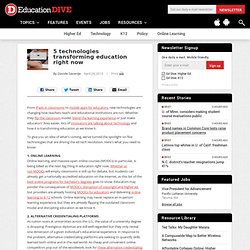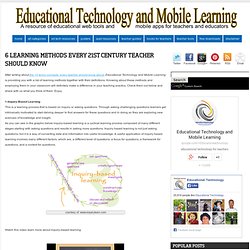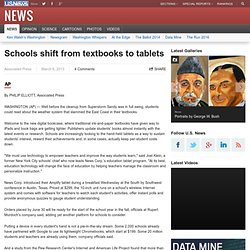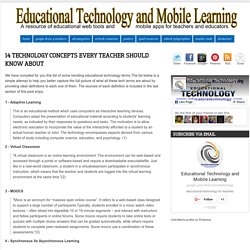

5 technologies transforming education right now. From iPads in classrooms to mobile apps for educators, new technologies are changing how teachers teach and educational institutions are run.

Whether they flip the classroom model, blend the learning experience or just make educators' lives easier, lots of innovators are talking about technology and how it is transforming education as we know it. To give you an idea of what's coming, we've turned the spotlight on five technologies that are driving the ed tech revolution. Here's what you need to know: 1. ONLINE LEARNING Online learning, and massive open online courses (MOOCs) in particular, is being billed as the next big thing in education right now. 2. 3. 4. 5.
Would you like to see more education news like this in your inbox on a daily basis? The 7 Most Powerful Idea Shifts in Learning Today. 6 Learning Methods Every 21st Century Teacher should Know. After writing about the 14 techy concepts every teacher should know about, Educational Technology and Mobile Learning is providing you with a list of learning methods together with their definitions.

Knowing about these methods and employing them in your classroom will definitely make a difference in your teaching practics. Check them out below and share with us what you think of them. Enjoy1-Inquiry-Based LearningThis is a learning process that is based on inquiry or asking questions. Through asking challenging questions learners get intrinsically motivated to start delving deeper to find answers for these questions and in doing so they are exploring new avenues of knowledge and insight.As you can see in the graphic below inquiry-based learning is a cyclical learning process composed of many different stages starting with asking questions and results in asking more questions.
Education in a digital world [VIDEO] Schools shift from textbooks to tablets - US News & World Report. By PHILIP ELLIOTT, Associated Press WASHINGTON (AP) — Well before the cleanup from Superstorm Sandy was in full swing, students could read about the weather system that slammed the East Coast in their textbooks.

Welcome to the new digital bookcase, where traditional ink-and-paper textbooks have given way to iPads and book bags are getting lighter. Publishers update students' books almost instantly with the latest events or research. Schools are increasingly looking to the hand-held tablets as a way to sustain students' interest, reward their achievements and, in some cases, actually keep per-student costs down.
"We must use technology to empower teachers and improve the way students learn," said Joel Klein, a former New York City schools' chief who now leads News Corp.' News Corp. introduced their Amplify tablet during a breakfast Wednesday at the South by Southwest conference in Austin, Texas. Putting a device in every student's hand is not a pie-in-the-sky dream. Keynote. 14 Technology Concepts Every Teacher should Know about. We have compiled for you this list of some trending educational technology terms.The list below is a simple attempt to help you better capture the full picture of what all these tech terms are about by providing clear definitions to each one of them.

The sources of each definition is included in the last section of this post enjoy 1 - Adaptive Learning This is an educational method which uses computers as interactive teaching devices. Computers adapt the presentation of educational material according to students' learning needs, as indicated by their responses to questions and tasks. The motivation is to allow electronic education to incorporate the value of the interactivity afforded to a student by an actual human teacher or tutor. 2 - Virtual Classroom "A virtual classroom is an online learning environment. "Mooc is an acronym for “massive open online course”. How 21st Century Thinking Is Just Different. How 21st Century Thinking Is Just Different by Terry Heick This content is proudly sponsored by The Institute for the Habits of Mind, promoting the development of personal thinking habits in 21st century learners.

In an era dominated by constant information and the desire to be social, should the tone of thinking for students be different? After all, this is the world of Google. In this world full of information abundance, our minds are constantly challenged to react to data, and often in a way that doesn’t just observe, but interprets. As a result, the tone of thinking can end up uncertain or whimsical, timid or arrogant, sycophant or idolizing–and so, devoid of connections and interdependence. The nature of social media rests on identity as much as anything else—forcing subjectivity on everything through likes, retweets, shares, and pins. But this takes new habits. Information Abundance Persisting. Managing impulsivity. Responding with awe.